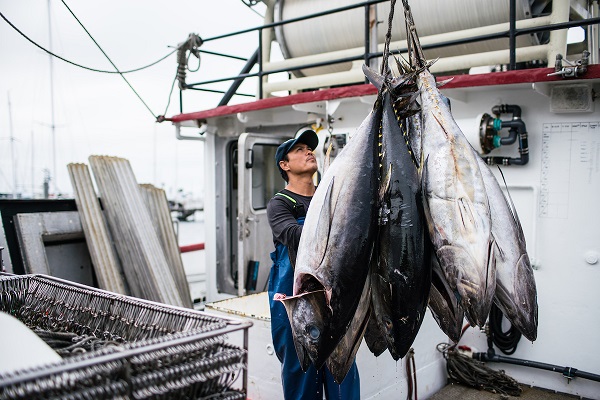
NMFS publishes final rule on drift gillnet hard caps
The National Marine Fisheries Service published a final rule on “hard caps” for certain protected species taken in the California/Oregon thresher shark/swordfish large mesh drift gillnet (DGN) fishery on February 7, 2020, which implemented a 2015 Council recommendation.
Under the regulations, the DGN fishery would immediately close if a hard cap (limit) on mortality or injury is met or exceeded for certain protected species during a rolling two-year period. The hard caps apply to observed mortality and injury to fin, humpback, and sperm whales, leatherback, loggerhead, olive ridley, and green sea turtles, short-fin pilot whales, and bottlenose dolphins. The hard caps recommended by the Council were more conservative than the Endangered Species Act consultation standards for these species, and were intended to further incentivise bycatch avoidance by the fleet.
After the Council transmitted its 2015 recommendation to NMFS, a proposed rule was published, but NMFS withdrew the rule after considering public comment and additional economic analysis of the Council’s recommendation. Oceana sued NMFS over the withdrawal of the rule, and a Federal court found in their favor and ordered publication of the final rule. In September 2020 the Council may consider whether to propose modifications to these regulations based on public comment, and in doing so review a NMFS analysis of the economic impacts of the regulations. If the Council decides to move forward, it would follow its multi-meeting process to consider regulatory changes.
Dept. of State representative Hogan discusses U.S.-Canada
Albacore Treaty negotiations
In March the Council discussed negotiations related to the U.S.-Canada Albacore Treaty with David Hogan, the Council’s representative from the Department of State. The U.S.-Canada Albacore Treaty governs access by albacore fishing vessels of each country to the Exclusive Economic Zone of the other. The Treaty has been periodically amended over the past decade to establish three-year “fishing regimes” that specify access for the purpose of fishing and port privileges. Since the current fishing regime has expired, if desired, a new agreement will have to be negotiated before the start of the next fishing season on June 15, 2020. Absent an agreement, U.S. fishermen would not be allowed to fish in Canadian waters, land fish in Canadian ports, or pick up Canadian crew members.
In their report, the Highly Migratory Species Advisory Subpanel requested that NMFS and the Department of State respond to previous requests for data about the 2019 fishing season and the impact of possible designation of a marine protected area in waters off Vancouver Island on the albacore troll fishery. The Subpanel also raised concerns about the lack of communication between the U.S. and Canada regarding seizure of a U.S. vessel and a shipment of albacore from the South Pacific, and the outcome of the scheduled North Pacific albacore stock assessment.
Highly migratory species essential fish habitat review begins
In March the Council adopted an action plan for reviewing essential fish habitat for highly migratory species, which was originally described in 2003 and has yet to be reviewed. The Council will coordinate with the NMFS West Coast Region and the Southwest Fisheries Science Center on Phase 1 of the review, which will mainly consist of a literature review and annotated bibliography. The Phase 1 report is tentatively due in September 2020. Based on the Phase 1 results, the Council will determine if changes to the description of essential fish habitat, prey species, or the effects of fishing or non-fishing impacts require updating. If so, the Council can initiate Phase 2, which would amend the fishery management plan as necessary.
